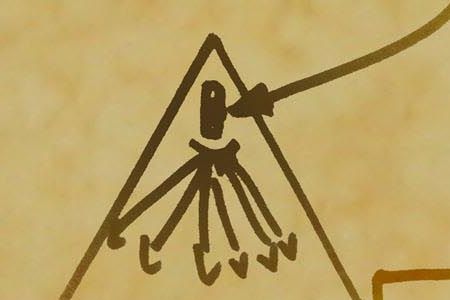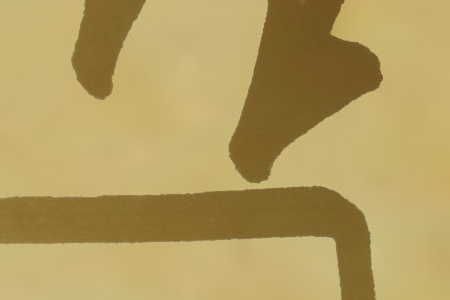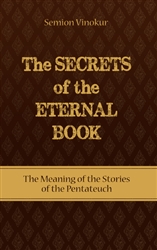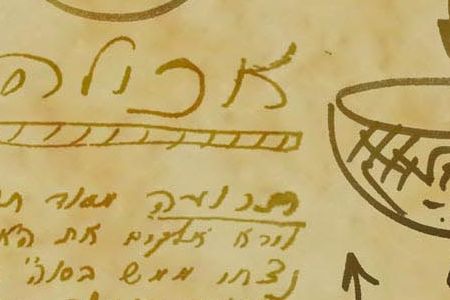Deuteronomy, 32:1-32:52
This Week’s Torah Portion | September 1 – September 7, 2013 – Elul 26, 5773 – Tishrei 3, 5774
In A Nutshell
The portion, Haazinu (Give Ear), deals with the entrance to the land of Israel. Moses begins with a song that serves as a reminder to the people when they abandon the work of the Creator in the future. The song praises the guidance of the Creator and His choice of the people of Israel, and presents the people of Israel as stiff-necked and one that has turned to idol worship.
Afterward there is an explanation of the punishment in the case of committing idolatry, and a statement that the Creator will not help Israel against their enemies in such a case. However, to the extent that Israel repents, the Creator will save them from all their enemies.
When Moses concludes reading his song, the Creator commands him to climb up Mount Nevo and look from there at the land of Israel. He tells Moses that he will die and will not be awarded entrance to the land of Israel.
Commentary by Dr. Michael Laitman
The Torah contains all the secrets of the world. The Torah means instruction; it guides us on how we should conduct ourselves in order to advance. The Torah speaks of the whole of creation; it helps us cope with difficulties and shows us what to do.
The big question is why the Torah ends before the entrance to the land of Israel. In truth, the struggles, problems, the great dilemmas, and the difficulties of coping with all that awaits the people henceforth— especially in this portion,—are already in us.
The people has reached a state where it is ready to advance and enter the land of Israel, to cope with all the problems, and to rise above them. It is precisely through this war that the people acquires the land of Israel. The story speaks of our desires, our forces, which have become corrected through the light, through everything that we have done and went through in the desert in order to be ready to enter the land of Israel.
The song, Haazinu, praises the Creator, the force of bestowal. It stresses that we must always remember to interpret what is happening accurately, and extol the force of bestowal, the value of love of others, which is the great rule of the Torah, and for which we do all that we do. “Love your neighbor as yourself” is more just than a maxim; it is the purpose of each and every action, a rule that includes all our efforts.
The song praises the people of Israel, those desires in us that want to rise, be like the Creator, giving with the aim to bestow or even receiving with the aim to bestow. The song praises all those desires called “the people of Israel” because they are the greatest and the most important.
Every now and again we should remind ourselves that the Creator supports us only in acts of bestowal. That is, if we wish to receive any support or blessing on our way, we will merit them only if we advance toward the conquering of the land, toward conquering all of our egotistical desires—which currently govern us—and turn them into the aim to bestow.
We should see it in our world today, as well. We are being exposed to our own corrupted system, the inclusive global crisis, which can be resolved only through bonding between us. This is the only way we can rise above the overall crisis and build what is called the “spiritual land of Israel.”
Exiting the crisis is our own exodus from Egypt—through the great problems we are experiencing, through the vagueness, miscomprehension, and disorientation, just as in the desert. We have no idea where to go or how to get there. no clear goals, no idea what we should do, and yet we arrive at the land of Israel. We cross the desert when we give up everything out of the desire to truly be in the aim to bestow, in unity between us. When we begin to connect, we build between us a desire that is Yashar El (straight to God), Ysrael (Israel).
Eretz (land) comes from the word Ratzon (desire). It is Yashar El when all our desires aim at one another and the network of connections between us builds the Kli called Eretz Ysrael (land of Israel).
This is why it is written that once humanity completes the process of corrections and scrutinies, the land of Israel will spread throughout the world as “The land of beauty.” [1] In the end, all the desires of humanity will unite and become one, “as one man with one heart,” and this is the main theme of the great singing, Haazinu.
If we do not advance toward that, we will face problems and troubles, which will not only turn us around and mercilessly direct us back toward the goal and without favorable support, but they will also show us where we are erring each time and how we should advance.
Moses is only an observer. He cannot do more than that. He only makes the general correction of looking at the land of Israel. Moses is called the “faithful shepherd,” the pure quality of bestowal. This is why he can only see the land of Israel in the light that is in GAR de Bina, by which he will help pave the way for the people Israel, through his gazing.
Gazing refers to corrections. Being the Rosh (head) of the degree is what Moses does. It is also how we enter the land of Israel, as well as traverse it using Moses’ power.
The title of the portion is Haazinu (Give Ear). What is Haazinu and what is singing?
There is no seeing before the land of Israel. All of our Kelim (vessels) are Kelim of hearing and seeing. Hearing is the degree of Bina, and seeing is the degree of Hochma. Afterward, both of them rise together to Keter.
We ourselves are in Malchut, so first, Malchut ascends to Bina. We ascend to Bina through the desert. The force of bestowal walks ahead and we chase it, striving to catch up with it against our will.
That state, that journey, is truly a desert: dry, lifeless, empty, and everything happens with great difficulty. Yet, this is the only way to obtain the force of bestowal above our will to receive.
Man is built to want to enjoy life. This is why we all strive to satisfy ourselves. We do not want to be considerate of anyone, as though our will to receive is telling us, “I want to have the whole world and the next world, and there is no one in the world but me and the Creator, who will serve me.”
We have to correct ourselves into the opposite, and advance in such a way that all of our “selves,” our desires, thoughts, qualities, and everything within us and about us aims to bestow. These corrections will allow us to connect to the whole of the great Kli and discover the spiritual world and our own spiritual lives, where we are included in this immense force called “Creator,” so we do not feel that we belong to the animate level, but to another level of existence.
We build what is called the “speaking” by acquiring the force of faith, to only bestow, to connect with others, to only find channels of bestowal and connections we are not yet activating.
In the desert, we need Moses’ power, which is like the sun. Joshua, with whom we enter the land of Israel, is like the moon. When we rise above Egypt, we face our own egotistical desire and acquire the level of Bina, the level of Ozen (ear), hearing.
Moses, who began the degree on Mount Sinai, is also the one who now ends it, upon the entrance to the land of Israel, on Mount Nevo, which is his last stop. Haazinu is the conveyance of Moses’ force, which we acquired one at a time in the forty years of the desert.
Forty is the sign that we have risen to the level of forty, the degree of Bina. This is why it was said that a man is forbidden to study Torah (Kabbalah) before the age of forty. The level of forty means that a person has not yet acquired the degree of Bina, and therefore cannot see. He has not acquired seeing, but only hearing, and the Torah is called the “attainment of the Creator.”
Is Haazinu a sort of conclusion of the degree of Bina?
Conclusion means the connection of all the degrees of the desert, which are given to the people of Israel together, and prepare it to enter from the desert into the land of Israel.
Moses Revealed on the Day when He Departed from the World
“At the time when Moses said, ‘Give ear, O heavens, and I will speak,’ the worlds shook. A voice came forth and said, ‘Moses, Moses, why are you alarming the world? You are the son of man, and because of you the world will quake.’ He started and said, ‘For I shall call on the name of the Lord.’ At that time they became silent and listened to his words.”
Zohar for All, Haazinu (Give Ear), item 22
This concludes Moses’ role, and he hands over everything to Joshua, the degree of the moon. Joshua is not bestowing of his own, but only of what he received from Moses. Joshua acquired from Moses the force of bestowal only because he was devoted to him. He did not study, but served him.
We, too, need to understand that if we serve the world, then we will rise and acquire the whole of creation. This is the role of the Israeli nation, to be “a light for the nations,” to correct ourselves and be “a kingdom of priests and a holy nation” (Exodus 19:6).
In the degree of the desert, we correct ourselves and prepare ourselves to serve others. In the degree of the land of Israel, we begin to work with the desires to receive and turn them into ones that aim to bestow. These degrees testify that we are already working with the nations of the world, meaning with the whole of humanity.
What does it mean that the Creator helps or does not help the nation face its enemies? How does one tell if He is helping or not?
We are always in the constant state where everything is filled with light and the Creator is ever-present. However, all of it is hidden from us because we are hiding it with our uncorrected Kelim, with our desires and thoughts. The more corrected we become—connected among us in bestowal, love, and unity—the more we will discover the force that fills the whole of reality, even now.
Therefore, whether He helps or not depends on a person’s direction. If a person is moving toward Him, labors to be like Him, to the extent of one’s equivalence of form with the Creator—according to the laws of equivalence of form—one discovers Him. It is just as a radio receiver operates: when it is tuned to receive the right wavelength, we hear what is present on that frequency.
Is it enough to want it or does one also need to carry it out?
We need to perform certain actions, but not in order to say, “I want it,” but in order to really want it. Therefore, wanting is enough, but it is not simple to say, “I want it.” It is not a matter of words. Rather, within that desire there must also be the decision that all I want is for it to happen.
For example, if a person wishes to connect with others only in order to benefit others, in “love your neighbor as yourself,” that person must examine how he or she is trying to use the whole of reality in favor another, and then in favor of more and more people. This is the opposite of the way people act now, when we use the whole of reality for ourselves.
In other words, does the other become more important than the self?
This is the meaning by “as yourself,” more than yourself. It is just as a mother treats her baby.
Should it be in the intentions? Is it not enough to physically give to others all that I have?
It is not about the physical world. This world is completely insignificant here. This concerns the connection of the hearts, our souls, our emotions, since the whole of reality—the whole of the matter that has been created—consists of desire. By “desire” we mean its direction and how we use it. We need nothing but to want, as it is written, “The Lord will finish for me” (Psalms 138:8).
The upper force that we discover as being here among us is what builds the network. This is the work of God. We need not do a thing; there are no actions in us; we cannot do anything but ask that it will be done. We saw it with the people that erred in different deeds in the transit through the desert, when it did not know how to ask, how to demand, how to reveal.
There is an element here that seems educational. The Creator is seemingly saying, “I know you will sin in your direction in some way. You will be punished for it and then you will repent.” What good will it do?
When you bring up a child you do not say such a thing, but rather, “Listen, it’s best for you to do this or that,” while giving a personal example. When the child errs we let him or her understand that it was a mistake. We do not come to a child and say, “We know you will make mistakes, so be careful because you will be punished, but then you will repent and you will be fine.” These are not helpful words.
We are not required to be good. Rabbi Akiva knew about the ruin of the Temple in advance, so when the ruin finally arrived he laughed. Jacob wanted to tell all his sons about what was happening to them. Rabbi Shimon knew what sort of book he was writing, and for what times, as well as what would happen along the way, and we, too, need to experience these events. From this time on we are beginning to discover that everything is right before us and has been prepared for us.
It is clear that we will make mistakes every step of the way, and each of us will discover the sin of Adam HaRishon in all of our 613 desires. Yet, our mistake will be if we do not ask, if we do not request and demand of the upper force, the Creator. Only when we connect with others as much as we can do we discover how we hate and repel them. Therefore, we must demand of the Creator to keep the connection, and not us, or the result will either be corruption or that we will discover that it is the opposite, and flee.
We need not be fear revealing the shattering between us, the great ego. We also need not bow to other gods. Rather, we should ask for the correction here instead of running.
If we do this, we will do everything correctly and we will not make mistakes. However, in truth, we make mistakes each time because we cannot quite discover our point of contact with the Creator. We must exert in the correct approach, as well, where we try to act like babies. But following great efforts and tremendous work, we must still err, reveal the shattering, and learn that we are incapable. Only then do we discover the right kind of evil.
We discover the evil of the right kind of shattering, the proper one. For that, too, we need the light, the revelation of the Creator. When it happens we see the place that the Creator needs to fix. We see the great shattering, the great correction, and we receive everything pre-prepared. In fact, we are only present in the process while it is happening—our great ego, the revelations, and up to the place of the shattering and its correction.
What is the idea behind the climb up Mount Nevo? Moses went up and gazed but was not permitted to enter the land of Israel. This sounds a little cruel because he was permitted to see the beauty from afar but was not permitted to reach it.
The Creator said to Moses in advance that they were approaching the land of Israel and that he was going to die, and that Joshua would replace him. It sounds inhuman, heartless, but the degree of Moses is not directly related to the land of Israel at the end of correction.
Moses represents the whole of the light of the sun, all the light. But for now the land of Israel needs to be conquered and corrected, and only the force of bestowal can enter the land of Israel, only Joshua, the light of the moon. By letting in and correcting that force, the light of the moon, Joshua’s role ends, and only then does the end of correction arrive.
Once the people of Israel has entered the land of Israel there are only ruins, expulsions, and exiles. After some time there is a return to the land of Israel, and only now are we implementing all the corrections and are arriving at a state where there are revelations of the genuine land of Israel, in the desire to receive with the aim to bestow. This is when we come to that state known as (Samuel 2, 23:20) “a valiant man of Kabzeel” (Rav Pe’alim Mekatze’el).
All the corrections we have made throughout the generations will come together in a single correction, the network of connections among us, among all the souls, will appear all at once, and everyone will truly be connected. This is when the force of Moses will burst, the light of the sun, together with Joshua, the force of the moon—“the two great lights” (Genesis 1:16)—and we will come to a day that is all good.
Have we made any corrections along the way? It seems that our current situation is worse than ever.
So far we have only been preparing ourselves. We have made no corrections so far, and we have not revealed all the corruptions. Only now, in this crisis, are we beginning to disclose them. The corruption and correction are close by; they are tied to one another. If we wish, we can do it very quickly because there is no need for them to be lengthy.
Is it up to us? It seems like the Creator is doing everything.
It depends on our request. We rush times. It is written (Masechet Berachot, 49a) that Israel sanctify (rush) times. We must “summon” the Creator to correct. It is the force of bestowal that is between us, the hidden light that is present even now, and which we must summon so as to correct us.
Summary:
Between us, we need the connection of “love your neighbor as yourself.” This is the entire correction we need to make. It is not simple, but it is the greatest thing, the great rule of the Torah. It is the whole of reality that must come together. Today we are discovering that we all need it. The whole world needs it, and this is the only way we will be able to come out of the crises we are in today.
We are truly in a shattered state, which is great. We are discovering the negative in us, and we need only demand of the Creator, together, with our common force, to try to connect us. Then we will discover Him, discover the spiritual, perfect, peaceful life, in endless harmony, to all, here and now.
[1] On that day I lifted up My hand unto them, to bring them forth out of the land of Egypt into a land that I had sought out for them, flowing with milk and honey; it is the beauty of all lands.



 “How to Change the World” is based on the book, The Secrets of the Eternal Book: The Meaning of the Stories of the Pentateuch by Semion Vinokur.
“How to Change the World” is based on the book, The Secrets of the Eternal Book: The Meaning of the Stories of the Pentateuch by Semion Vinokur.